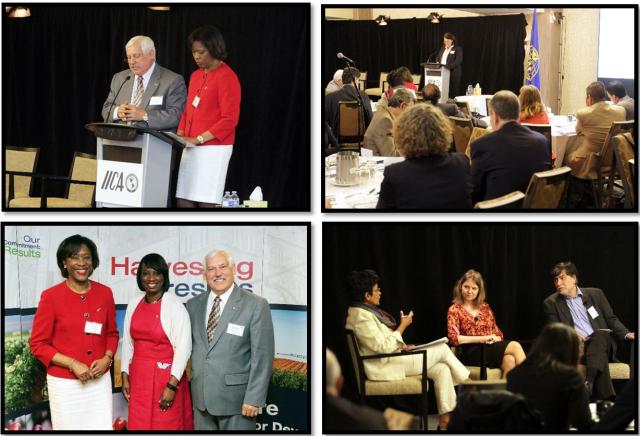During its Annual Accountability Seminar, IICA’s Delegation in Canada was pleased to host an interesting conversation on building resilience in food systems to address climate change impacts.

Ottawa, Canada. Climate change impacts are expected to have many dire consequences on the global food situation especially in areas that are already vulnerable. IICA, recognizing the vulnerabilities in the Americas, has as one of its strategic objectives: to improve agriculture’s capacity to mitigate and adapt to climate change and make better use of natural resources. The IICA Delegation in Canada’s accountability seminar provided an opportunity to host a discourse with eminently qualified professionals, to share insights and stimulate thought on the potential for future actions.
The conversation commenced with clarification on what is meant by “resilience”. The panelists also provided an overview of climate change impacts such as soil erosion, decreased biodiversity, pest and disease outbreaks, droughts and floods, all of which can directly impact food production. They reminded the audience that other aspects of food systems, such as access, utilization and market stability, can also be affected and limit food access. The conversation highlighted the complexity of the system and the importance of building resilience into the entire system so that it can withstand multiple and various shocks, with a focus on people, their communities, and the social systems that support them.
Acknowledging that food security is linked to a number of sectors, including health, agriculture, and now the environmental (climate change) sector, there is a greater need for policy and program coordination between donor agencies and governments. Panelists mentioned that there are similarities between countries and opportunities for transfer of lessons learned, policies, programs, and tools related to building resilient food systems.
The dialogue also covered aspects relating to the key features of resilient systems, effective targeting, engagement at the individual and community level, and the critical need for tools to monitor and assess interventions.

In describing Climate Smart Agriculture, Dr. Melgar-Quiñonez drew upon his experiences in Guatemala and the practices that sustainably increase agricultural productivity and system resilience while reducing greenhouse gas emissions. Specific note was made of the need to promote practices for conserving water and reducing food waste, as well as the need to ensure that new technologies are applicable to the realities of the developing world.
Dr. Bizikova stressed the importance of accurately measuring the performance of previous interventions in order to guide decisions for future programming. Understanding how all the elements within the system interact is key to identifying priority needs and for ensuring that marginalized people are included in the measurements and the interventions.
Participants expressed appreciation for the information shared and, although there was limited time, posed questions for the panelists. The panelists were asked to respond with their views on infrastructure investments to connect markets, role of biodiversity in building resilience, and the environmental impacts of trade in food.
The conversation concluded with some suggestions on actions going forward. In summary, the session was very informative and appreciated by all. Without a doubt, participants left the session with a new appreciation of the complexity, as well as the importance of ensuring our food systems are resilient to the expected climate change impacts.
The conversation was moderated by Cynthia Currie, a long-time friend of IICA’s, who introduced the subject and the distinguished guests, Dr. Livia Bizikova and Dr Melgar-Quiñonez.
Dr. Livia Bizikova is a Director responsible for Knowledge for Integrated Decisions at the International Institute on Sustainable Development (IISD), and has experience in the fields of sustainable development, scenario development, participatory planning and integrated assessment. Dr. Hugo Melgar-Quiñonez, Director of the Institute for Global Food Security, McGill University, has held appointments as a professor, researcher, and advisor on food security in several countries including Latin American countries.











